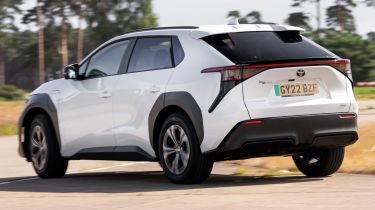Toyota bZ4X vs Hyundai Ioniq 5 vs Volkswagen ID.4: running costs and warranty
All three competitors are efficient, so your choice may come down to PCP costs or insurance prices

The Hyundai Ioniq 5 has the longest standard warranty here, offering five years of coverage, with no mileage limits. Both the Toyota bZ4X and Volkswagen ID.4 come with a fairly average three-year/60,000-mile warranty, however, Toyota’s warranty can provide cover for up to 10 years and 100,000 miles if you have the car maintained at one of its dealers.
The next big consideration when it comes to running costs is insurance, where the ID.4 wins big. Despite our test car being the sporty GTX model, it sits in insurance group 34, which is relatively low for an electric car in this class. The Ioniq 5 and bZ4X’s group rating of 40 illustrates that perfectly.
At least, like all electric cars, the Ioniq 5, bZ4X and ID.4 attract a 2% Benefit-in-Kind (BiK) tax rate, making them ideal company car picks. As a result, 20% taxpayers will need to fork out just £207 a year to run a range-topping Ioniq 5, or £206 for an ID.4 GTX, with bZ4X undercutting them both, receiving an annual company-car tax bill of £201 for a version like ours.
They’re also exempt from road tax (VED) for the time being, as well as the London Congestion Charge and other fees for entering some of the UK’s clean-air zones. Plus, service intervals for this trio are also longer than equivalent petrol or diesel-engined models, bringing maintenance costs down.
When it comes to efficiency, all three cars returned 3.4 miles per kWh (mi/kWh) during our time with them. That means, no matter which one you pick, it'll cost about £988 a year to charge up for 12,000 miles of driving, or £1,647 for enough charge to cover 20,000 miles.



